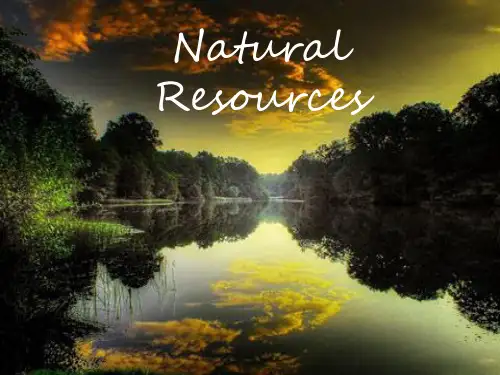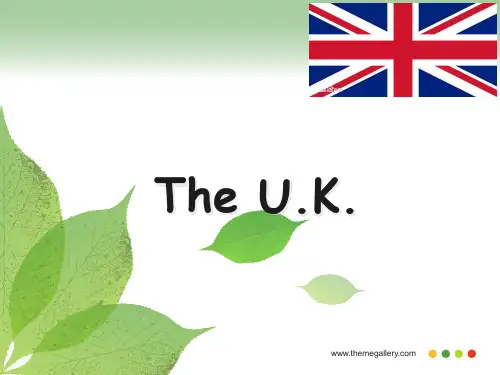Chapter-UK's-History文档
- 格式:ppt
- 大小:12.81 MB
- 文档页数:50
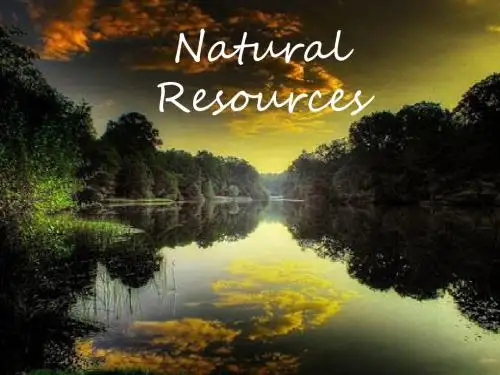

英国概况地理和历史部分work Information Technology Company.2020YEARChapter 1第一章Land and People英国的国土与人民I. Different Names for Britain and its Parts英国的不同名称及其各组成部分1.Geographical names: the British Isles, Great Britain and England.地理名称:不列颠群岛,大不列颠和英格兰。
2.Official name: the United Kingdom of Great Britain and Northern Ireland.官方正式名称:大不列颠及北爱尔兰联合王国。
3.The British Isles are made up of two large islands-Great Britain (the larger one) and Ireland, and hundreds of small ones.不列颠群岛由两个大岛—大不列颠岛(较大的一个)和爱尔兰岛,及成千上万个小岛组成。
4.Three political divisions on the island of Great Britain: England, Scotland and Wales.大不列颠岛上有三个政治区:英格兰、苏格兰和威尔士。
(1) England is in the southern part of Great Britain. It is the largest, most populous section.英格兰位于大不列颠岛南部,是最大,人口最稠密的地区。
(2) Scotland is in the north of Great Britain. It has three natural zones (the Highlands in the north; the Central lowlands; the south Uplands) Capital: Edinburgh苏格兰位于大不列颠的北部。
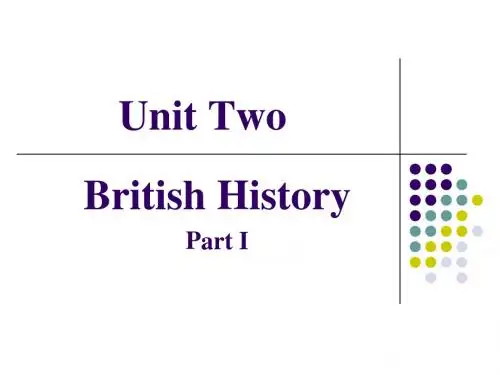
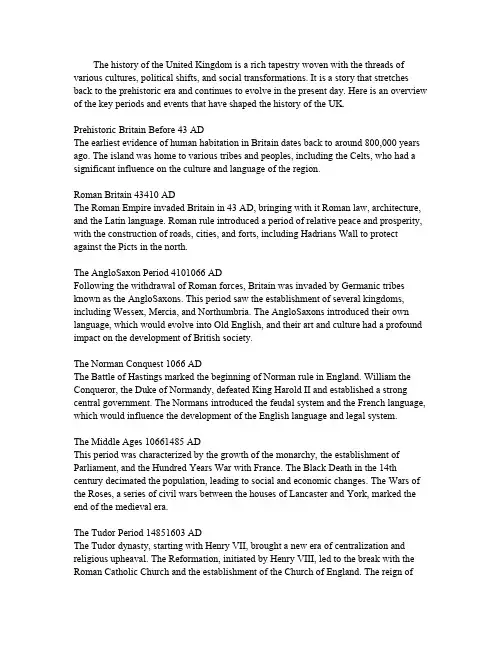
The history of the United Kingdom is a rich tapestry woven with the threads of various cultures,political shifts,and social transformations.It is a story that stretches back to the prehistoric era and continues to evolve in the present day.Here is an overview of the key periods and events that have shaped the history of the UK.Prehistoric Britain Before43ADThe earliest evidence of human habitation in Britain dates back to around800,000years ago.The island was home to various tribes and peoples,including the Celts,who had a significant influence on the culture and language of the region.Roman Britain43410ADThe Roman Empire invaded Britain in43AD,bringing with it Roman law,architecture, and the Latin language.Roman rule introduced a period of relative peace and prosperity, with the construction of roads,cities,and forts,including Hadrians Wall to protect against the Picts in the north.The AngloSaxon Period4101066ADFollowing the withdrawal of Roman forces,Britain was invaded by Germanic tribes known as the AngloSaxons.This period saw the establishment of several kingdoms, including Wessex,Mercia,and Northumbria.The AngloSaxons introduced their own language,which would evolve into Old English,and their art and culture had a profound impact on the development of British society.The Norman Conquest1066ADThe Battle of Hastings marked the beginning of Norman rule in England.William the Conqueror,the Duke of Normandy,defeated King Harold II and established a strong central government.The Normans introduced the feudal system and the French language, which would influence the development of the English language and legal system.The Middle Ages10661485ADThis period was characterized by the growth of the monarchy,the establishment of Parliament,and the Hundred Years War with France.The Black Death in the14th century decimated the population,leading to social and economic changes.The Wars of the Roses,a series of civil wars between the houses of Lancaster and York,marked the end of the medieval era.The Tudor Period14851603ADThe Tudor dynasty,starting with Henry VII,brought a new era of centralization and religious upheaval.The Reformation,initiated by Henry VIII,led to the break with the Roman Catholic Church and the establishment of the Church of England.The reign ofElizabeth I saw the flowering of English culture,with the works of William Shakespeare and the defeat of the Spanish Armada.The Stuart Period16031714ADThe Stuart dynasty faced religious and political conflicts,culminating in the English Civil War and the execution of Charles I.The monarchy was briefly abolished,and Oliver Cromwell ruled as Lord Protector.The Restoration in1660saw the return of the monarchy,but the Glorious Revolution in1688led to the establishment of a constitutional monarchy with the Bill of Rights.The Industrial Revolution17601840ADThis period marked a major turning point in British history,as the country underwent rapid industrialization.The growth of factories,railways,and urbanization transformed the economy and society.The British Empire expanded,with colonies in Asia,Africa, and the Americas,making Britain a global superpower.The Victorian Era18371901ADQueen Victorias reign saw the expansion of the British Empire,the consolidation of British industry,and significant social reforms.The Victorian era was also a time of great cultural and intellectual achievement,with the works of Charles Dickens,Thomas Hardy, and the scientific discoveries of Charles Darwin.The20th Century19012000ADThe20th century was a time of great change and upheaval for Britain.World War I and World War II had a profound impact on the country,leading to the decline of the British Empire and the rise of the United States and the Soviet Union as global powers.The postwar period saw the establishment of the welfare state and the continued decolonization of the empire.The late20th century was marked by economic challenges, the rise of the European Union,and the devolution of power to Scotland,Wales,and Northern Ireland.The21st Century2001PresentThe new millennium has seen Britain grappling with issues such as terrorism,climate change,and the ongoing debate over its relationship with the European Union.The Brexit referendum in2016and the subsequent negotiations have highlighted the complexities of national identity and international cooperation in the modern world.Throughout its history,the United Kingdom has been a place of constant change and adaptation,shaped by the interplay of internal and external forces.Its history is atestament to the resilience and adaptability of its people and the enduring impact of its cultural,political,and social contributions on the world stage.。
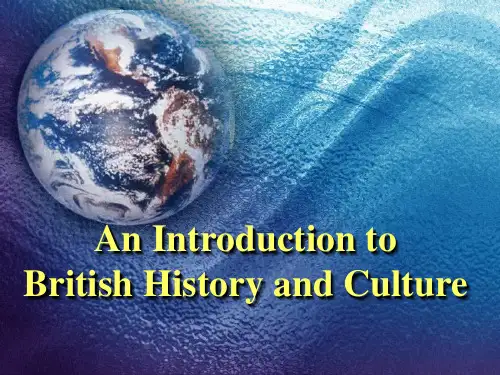

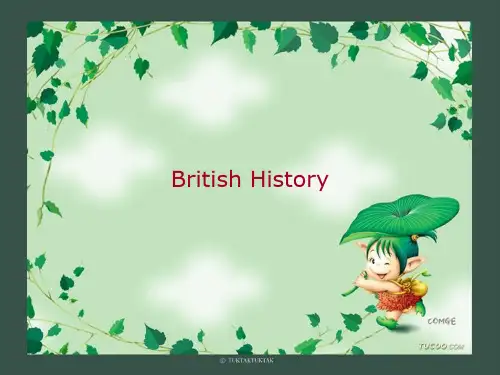
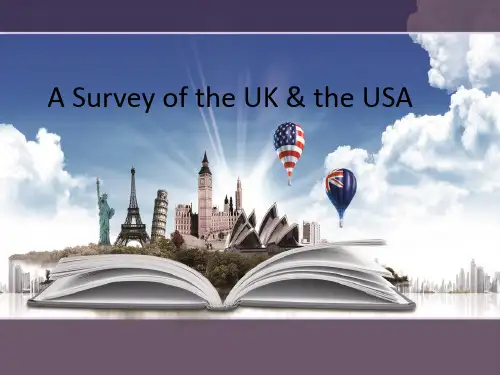
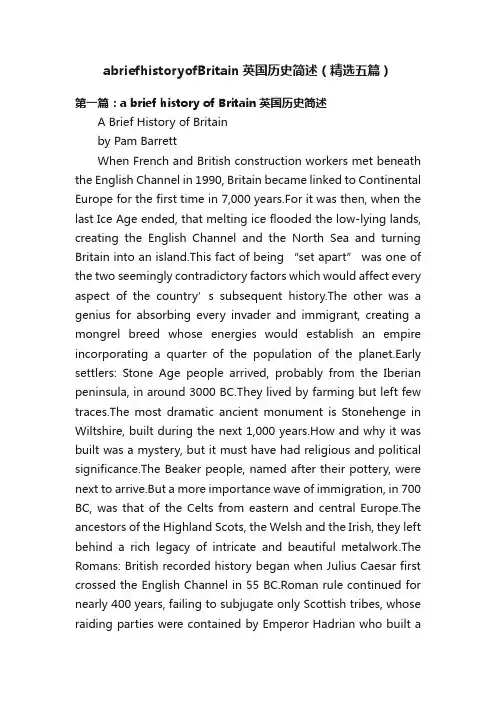
abriefhistoryofBritain英国历史简述(精选五篇)第一篇:a brief history of Britain 英国历史简述A Brief History of Britainby Pam BarrettWhen French and British construction workers met beneath the English Channel in 1990, Britain became linked to Continental Europe for the first time in 7,000 years.For it was then, when the last Ice Age ended, that melting ice flooded the low-lying lands, creating the English Channel and the North Sea and turning Britain into an island.This fact of being “set apart” was one of the two seemingly contradictory factors which would affect every aspect of the country’s subsequent history.The other was a genius for absorbing every invader and immigrant, creating a mongrel breed whose energies would establish an empire incorporating a quarter of the population of the planet.Early settlers: Stone Age people arrived, probably from the Iberian peninsula, in around 3000 BC.They lived by farming but left few traces.The most dramatic ancient monument is Stonehenge in Wiltshire, built during the next 1,000 years.How and why it was built was a mystery, but it must have had religious and political significance.The Beaker people, named after their pottery, were next to arrive.But a more importance wave of immigration, in 700 BC, was that of the Celts from eastern and central Europe.The ancestors of the Highland Scots, the Welsh and the Irish, they left behind a rich legacy of intricate and beautiful metalwork.The Romans: British recorded history began when Julius Caesar first crossed the English Channel in 55 BC.Roman rule continued for nearly 400 years, failing to subjugate only Scottish tribes, whose raiding parties were contained by Emperor Hadrian who built adefended wall right across the north of England.Eventually, threatened by barbarians at the gates of Rome, they abandoned Britain, leaving behind them a network of towns, mostly walled, a superb road system, and a new religion, Christianity.The next wave of invaders from central Europe – Angles, Saxons and Jutes – gradually pushed the native Celts west into Wales and north into Scotland.Anglo-Saxon dominance, too, lasted for four centuries, though it did not extend to Scotland, where a separate kingdom was forged by the Picts and the Scots.Although the Anglo-Saxons were a ferocious bunch, constantly squabbling, they laid the foundations of the English state, dividing the country into shires and devising an effective farming system.Their Teutonic religion, worshipping gods such as Woden and Thor, eclipsed Christianity until, at the end of the 6th century, the monk Augustine(once heard to remark “O Lord, make me chaste, but not yet”)converted the kings and the nobles.Monasteries sprang up, becoming places of learning.Treasures contained in the monasteries were a lure for the Vikings, whose ruthless raids from across the North Sea began in the 9th century.Initially they were defeated at sea by Alfred the Great, founder of the British Navy, but eventually they too were assimilated.Canute, the Danish leader, became king of Britain.The Norman Conquest: Links with Normandy, the part of France settled by the Vikings, were strong, and in 1066 William, Duke of Normandy, claimed the English throne.His triumph at the battle of Hastings decisively changed English history.As W.C.Sellar and R.J.Yeatman put it in their classic humorous history 1066 And All That: “The Norman Conquest was a Good Thing, as from this time onwards England stopped being conquered and thus was able to become top nation.”William parceled out the land to barons in return for their loyalty, and the barons parceled out land in turn to lesser nobles in return for goods and services.At the bottom were the peasants, whose feudal status resembled slavery – hence the potency of the Robin Hood legend, celebrating the Nottingham outlaw who stole from the rich to give to the poor.Although much of the Norman kings’ energies were devoted to protecting their borders, there was a great flowering of Norman culture, producing many erudite historians and scholars.In 1167 Oxford University was founded.Thanks to the influence of William Shakespeare’s history plays, much of the next period of English history is popularly remembered through his view of the shifting alliances of the Plantagenet and Tudor kings who ruled from 1154 to 1547.During this period of conflict and disease –the Black Death alone killed nearly half the population in 1348-49 –the royal succession was by no means assured.Power struggles propelled to the throne those who could command the greatest military backing from the majority of the rival barons, a process vividly illustrated by the Wars of Roses, the tussles between the House of Lancaster and York between 1455 and 1485.Frequent strife with France(including the intermittent Hundred Years’ War from 1337 to 1453)dominated international relationships.Internally, Wales was subjugated by 1288, though Scottish independence was recognized when Robert Bruce defeated English forces at the Battle of Bannockburn in 1314.Britain’s most famous king, Henry VIII, is remembered not only for his six wives(two of whom he had beheaded)but also for bringing about the Reformation, making England a Protestant rather than a Catholic countr y.His quarrel centred on the Pope’s refusal to annul his marriage to Catherine of Aragon, who couldnot oblige him with a male heir.Doctrinal differences aside, however, Henry capitalized on a growing distaste for the church’s excessive privilege and wealt h, and was thus able to get away with seizing enough monastic lands and property to finance his rule.Under Henry, Wales was formally united with England in 1536.The Age of Elizabeth: England entered its Golden Age under Elizabeth I, Henry’s daughter by Ann e Boleyn.The Elizabethan Age has a swashbuckling ring to it: the Virgin Queen and her dashing courtiers;the defeat of the Spanish Armada;Sir Walter Raleigh’s discovery of tobacco in Virginia;Sir Francis Drake’s circumnavigation of the world.Poetry, plays a nd pageantry flourished during her 45-year reign.When Elizabeth, the “Virgin Queen”, died without an heir, the throne passed to James VI of Scotland, who became James I of England, inaugurating the Stuart dynasty and effectively joining together the two kingdoms.The Stuart period was one of conflict between Crown and Parliament.James I, a staunch believer in the Divine Right of Kings, would have preferred no Parliament at all, and Charles I dissolved Parliament and initiated an 11-year period of absolute rule.The upshot was a civil war from 1622 to 1649;Charles lost and was beheaded.A period of republicanism followed, under the rule of Oliver Cromwell, but after his death the monarchy was restored and prospered under Charles II.His brother, who succeeded him as James II, was less circumspect and tried to restore absolute monarchy and the Catholic religion.The newly emerging political parties, growing in confidence, forced him to flee and invited his daughter Mary and her Dutch husband, Prince William of Orang e, to take the throne.This “Glorious Revolution”, although bloodless, was nonetheless a revolution and paved the way for Parliament’s permanent dominance overthe Crown.In 1707 an Act of Union united England and Scotland, although Scotland was allowed to retain its own Church and legislature.Many Scots felt that the union was bulldozed through by English politicians’ intent on improving their international trade prospects, and Scottish pressure to unravel the union is still a political issue.Political pragmatism triumphed again in 1714 when, a reliable Protestant monarch being needed in a hurry, a search through the family tree came up with George I of Hanover in Germany.Although he spoke no English and had little interest in his subjects, he founded a dynasty which was to span 115 years and encompass an expanding empire and an industrial revolution.The age of empire: Despite the loss of its American colonies in 1783, Britain’s trade-driven adventurism was undiminished, giving it control of West Africa and India, Newfoundland and Nova Scotia, some Caribbean island, and Australia and New Zealand.At home, farmers embraced more efficient and profitable methods, which led to the eviction of many peasant farmers who either emigrated to the New World, carrying with them a resentment that would bequeathed to future generations, or left the land to find work in the towns, which rapidly became overcrowded.This combination of landowners with surplus capital to invest and laborers in search of a living was one reason why British became the first country to industrialize.Political stability helped too, as did the security of being an island, natural resources, good trade arrangements and a native genius for inventing things.The Scottish inventor James Watt modified and improved the steam engine in the 1770s, opening the way for the efficient powering of trains, ships and factory machinery.The invention of the Spinning Jenny and the power loom created mass production in textiles.The smelting ofiron with coke, instead of charcoal, hugely increased the production of iron.A massive building program of railways, roads and canals created a new class of industrialist, whose fortunes rivaled those of the aristocracy.But it also created abominable working conditions in mines and factories, conditions which led to the slow and painful development of trade unionism.Political reforms, seized elsewhere in Europe by revolution, came gradually in Britain.Parliamentary seats were distributed more fairly among the growing new towns, but voting was still based on property ownership and universal suffrage didn’t come until 1918(and even then was scarcely universal since it excluded women under 30).The problem that dominated parliamentary debate during this period was the intractable Irish Question.The resentment over centuries of British rule in Ireland bubbled to the surface after the potato famines of the mid-1840s, when about 20 percent of Ireland’s population died of starvation and more than a million people emigrated to escape a similar fate.Demands for Irish independence grew but they were demands which many English politicians, conscious of the security problems of having an independent and possibly none-too-friendly neighbor to their west, were reluctant to grant.As with today’s IRA campai gn, the debate had a backdrop of violence.T oday, however, the Victorian Age is remembered as a time of exuberant self-confidence, symbolized by the building in London of the Crystal Palace to showcase Britain’s industrial and technical achievements in the Great Exhibition of 1851.But many of London’s inhabitants might well have wondered when they would benefit from all these accomplishments.For them, the squalor and crime which Charles Dickens portrayed so evocatively in his novels were all too real.Working-class lifeimproved considerably during the last quarter of the 19th century.Many homes had gas lighting and streets were cleaned by the new municipal councils.A new police force contained crime.The music hall provided inexpensive entertainment in towns.Bicycles became a common method of transport, and a trip by train to seaside resorts was for many a highlight of summer.In London, trains in the world’s first underground railway began puffing their way through smoke-filled tunnels between Paddington and Farrington in 1863.Art and drama flourished.By the time of Queen Victoria’s Diamond Jubilee in 1897, the country was feeling quite pleased with itself.Britannia ruled the waves, and anything seemed possible.The 20th century: But all good things come to an end.The Boer War of 1900 ended in victory for the British in South Africa but damaged its international reputation.France, Germany and America were becoming powerful competitors for world markets.The newly united German state was flexing its military muscles.The Edwardian era of the early 20th century, seemingly an idyllic time, was built on shifting sands.Dragged into World War I by a complex web of international alliances, Britain faced unimaginable carnage in which more than a million of its young men died.Social unrest at the end of the war, though less devastating than in the defeated Germany, gave more power to women(who had shouldered a heavy burden while the men were at war)and led to a General Strike by dissatisfied workers in 1926.The Irish Question was partly answered with the creation of an independent Irish free State, but six Protestant-dominated counties in the north stayed under UK rule – a time bomb which exploded in 1969.The shock waves from the 1929 New York Stock Market crash plunged Britain into depression, throwing millionsout of work, especially in the industrial areas of northern England, south Wales and Clydeside in Scotland.The monarchy was rocked by crisis in 1936 when Edward VIII, who had just become king, decided to marry the twice-divorced Mrs Wallis Simpson.His family, the church and the government opposed the match, forcing him to abdicate.His brother, a reluctant George VI, restored the monarchy’s popularity, not least through the support which he and his wife Elizabeth(later the Queen Mother)gave to their subjects during the German air raids of World War II.Although Britain’s island status saved it from invasion, this war involved civilians in an unprecedented way.Cities like Coventry were devastated by bombing and the Blitz radically changed the face of London for the first time since the Great Fire of 1666.Many children were sent to live in the countryside.Most social inequalities were set aside during the war and, when peace returned in 1945, voters turned to the Labour party in hope that it could develop an even greater egalitarianism.It laid the basis of a welfare state, providing free medical care for everyone as well as financial help for the old, the sick and the unemployed.But the war had left Britain broke.While Germany and Japan rebuilt their industries almost from scratch, helped by international aid, Britain was left to patch together a severely damaged economy.It could no longer sustain an empire, and gradually its colonies became independent.Many former subjects, especially from the Caribbean and the Indian sub-continent, settled in Britain, raising fears of racial conflict that, despite some serious tensions, were never(quite)fulfilled.As the austere 1950s gave way to the ’60s, things started to look up.New universities were built, a motorway network launched, and a reinvigorated culture promoted by a group of writersdubbed “the angry young men”.Much of the explosion of new talent came from the north of England: actors like Albert Finney, playwrights like Alan Sillitoe, and pop groups galore, led by the Beatles.The swinging Sixties, powered by a newly affluent youth, had arrived.Britain’s heavy industry might be in trouble, but in fashion and pop music it led the world.The good times died in the 1970s as inflation and unemployment soared and labour unrest led to endless strikes.Joining the European Community in 1973 seemed to produce few obvious economic benefits and revenues from North Sea oil were quickly spent rather than invested.Margaret Thatcher came to power in 1979 promising tough new policies.Her popularity quickly faded, but was revived in 1982 by the Falklands War when an invading Argentinean force was beaten off the South Atlantic islands, remnants of the old empire.Although she went on to win two further elections convincingly, by 1990 her popularity, always firmer abroad than at home, was so shaky that her party, fearing that she would not win them the next election, replaced her with a less combative leader, John Major.He duly won the 1992 election, but a reinvigorated Labour Party under T ony Blair won in 1997.The overall problems did not change, though.The economy remained weak, distrust of the European Community did not abate, nationalism simmered in Wales and Scotland, the conflict in Northern Ireland dra gged on, and the Royal Family’s private life continued to obsess the tabloid press.It was business as usual, in fact – which, in a country obsessed by continuity, was immensely reassuring.第二篇:材料学的历史简述姓名:何莞晨学号:2014012075材料学的历史简述1.按材料划分的时代生活离不开材料,人类的一切生产活动所需的工具都建立在合适的材料的基础上。
